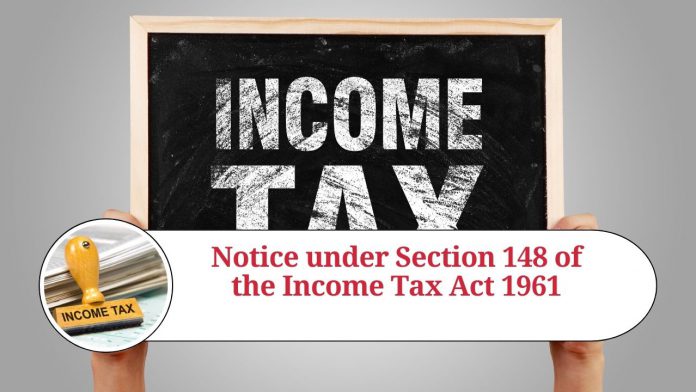If you have received a notice under section 148 of the Income Tax Act 1961, it means that the Income Tax Department has reason to believe that you have not disclosed your entire income in your tax return. Section 148 empowers the Assessing Officer to issue a notice to assess or reassess your income. This can be a daunting situation, but there are steps you can take to respond to the notice and protect your interests.
Here are the steps you should take when you receive a notice under section 148:
- Read the notice carefully: The first step is to carefully read the notice and understand the reason for the notice. The notice should specify the reason for the notice and provide details of the income that has not been disclosed.
- Check the validity of the notice: The notice should be issued within four years from the end of the assessment year. For example, if the assessment year is 2021-22, the notice should be issued on or before March 31, 2026. If the notice is not issued within the prescribed time limit, it may be invalid.
- Respond to the notice: You must respond to the notice within the prescribed time limit, which is usually 30 days from the date of receipt of the notice. If you fail to respond within the time limit, the Assessing Officer may proceed with the assessment or reassessment without any further notice.
- Obtain necessary documents: You should gather all the necessary documents related to your income, expenses, investments, and deductions. This will help you to provide accurate and complete information to the Assessing Officer.
- File a reply: You should file a reply to the notice, stating your objections to the notice and providing reasons for the non-disclosure of income, if any. You should also attach supporting documents to your reply.
- Attend the hearing: The Assessing Officer may ask you to attend a hearing. You should attend the hearing and provide all the necessary information and documents to the Assessing Officer. You may also seek the assistance of a tax professional to represent you during the hearing.
- Appeal: If you are not satisfied with the assessment or reassessment order, you may appeal against the order to the Commissioner of Income Tax (Appeals) within 30 days from the date of receipt of the order.
In conclusion
receiving a notice under section 148 can be a challenging situation. However, if you respond to the notice promptly and provide accurate and complete information to the Assessing Officer, you can protect your interests and avoid any penalties or consequences. It is always recommended to seek the assistance of a tax professional to guide you through the process and ensure that your rights are protected.
Read more useful content:
- section 145 of income tax act
- section 10e of income tax act
- section 9 of the income tax act
- section 94b of income tax act
- section 206aa of income tax act
Frequently Asked Questions (FAQs)
Q: What is a notice under section 148 of the Income Tax Act 1961?
A: A notice under section 148 is issued by the Income Tax Department if they believe that the taxpayer has not disclosed their entire income in their tax return.
Q: How much time do I have to respond to the notice under section 148?
A: The taxpayer usually has 30 days from the date of receipt of the notice to respond.
Q: What should I do after receiving the notice under section 148?
A: The taxpayer should carefully read the notice, check the validity of the notice, gather necessary documents, file a reply, attend the hearing if required, and appeal if not satisfied with the assessment or reassessment order.
Q: What documents should I gather to respond to the notice under section 148?
A: The taxpayer should gather all the necessary documents related to their income, expenses, investments, and deductions.
Q: What should be included in my reply to the notice under section 148?
A: The taxpayer should provide objections to the notice and reasons for the non-disclosure of income, if any. The reply should also include supporting documents.
Q: Can I seek assistance from a tax professional to respond to the notice under section 148?
A: Yes, it is recommended to seek the assistance of a tax professional to guide you through the process and ensure that your rights are protected.
Q: What happens if I don’t respond to the notice under section 148?
A: If the taxpayer fails to respond within the time limit, the Assessing Officer may proceed with the assessment or reassessment without any further notice.
Q: Can I appeal against the assessment or reassessment order?
A: Yes, if the taxpayer is not satisfied with the assessment or reassessment order, they may appeal against the order to the Commissioner of Income Tax (Appeals) within 30 days from the date of receipt of the order.




















